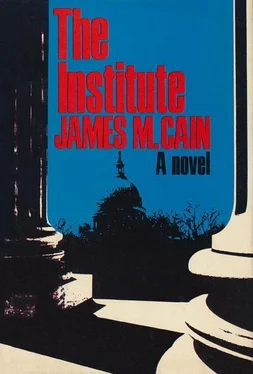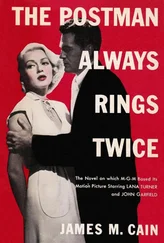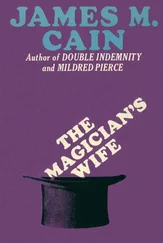“You must be Dr. Palmer,” she said. “Horty’s spoken of you, and your picture was in the papers.”
I kept wondering who she was, then a bit grandly, she said: “I’m Mrs. Mendenhall, Horty’s mother.”
So I knew who she was at last, and I also knew the reason for the pink complexion after what Teddy had told me. But I played up to her, assuring her: “Oh, yes, of course; Hortense has mentioned you often. How is she?”
“Critical, is all they’ll tell you, which sounds bad, and I guess is. The paper’s not much help. She was still in surgery when they went to press.”
“We’ll keep our fingers crossed.”
“It’s all we can do.”
We stood there for another dead ten minutes on a day that had seemed all dead. I had not had any breakfast, which may have been one reason I felt so dull. And, of course, I was numb from loss of sleep and the reaction to what had happened — or lack of reaction, actually, as part of my trouble seemed to be that I couldn’t quite get caught up on where I was. But not knowing where I was was partly the reason for that. I couldn’t possibly know until I knew something about Hortense’s condition. So I stood there, first on one foot and then on the other.
At last the door opened and a nurse was whispering to the nurse standing with us. Then one by one, after checking against the card, they led us into a large room with beds head to the wall, a doctor walking around, and another nurse directing us. She said something to Mrs. Mendenhall and led us to a bed at one side halfway down the room, and finally we were with Hortense — if the wraith in the bed was her. I hardly knew her, she was so pale. Her hair was combed out in a strange, unnatural way, she had a hospital jacket on, and tubes led down to her arms from bottles above her head. Mrs. Mendenhall whispered to her: “Horty, it’s your mother, and here’s Dr. Palmer.”
She patted one of Hortense’s hands, and I patted the other. She didn’t open her eyes, but I could tell that she heard what we said and felt what we did.
“We’re pulling for you,” I said softly; “I love you.”
“Yes, we both do,” Mrs. Mendenhall said.
That made a family matter out of something I meant as personal; but I let it pass. Then a doctor came by holding his watch up at us, and we left after whispering: “See you tonight.” Then we were out in the hall. I told Mrs. Mendenhall that I hadn’t had breakfast and asked her to join me. But she said she had to get on to Watergate and “get myself organized there. They caught me in Chester with it. I can’t say I was much surprised, since Richard was playing with fire, as I, for one, tried to tell him. Yet when a thing like this happens, it’s like bricks falling on you. I drove straight here; I haven’t even been to the apartment.”
She seemed to know where we were going, and I went along without paying much attention, down a flight of stairs and along a hall to a large window with a lighted room behind it. She tapped on the glass and a nurse appeared inside. The nurse disappeared, then came back pushing a bassinette. Then we were staring down at a tiny, sleeping infant under a blue blanket.
“He’s simply beautiful,” Mrs. Mendenhall said. “The spitting image of Richard.”
To say I was stunned would be the understatement of my life. I suppose, little by little, my mind caught up with what this woman had known, that before surgery could be performed to remove the bullet, this baby had to be taken out. My mind also caught up with the remark she had just made about the child’s resemblance to Garrett, which seemed to say that she had no idea of its relationship to me. I still stood there. Suddenly she said “Be back” and fluttered down the hall. Then she was back, but a whiff of her breath told me what she had been doing, no doubt from a flask in her handbag, in the ladies’ room.
That night was A repetition of the afternoon, but the next day at two, I was there again in line outside the door of Intensive Care. In a minute here came Mrs. Mendenhall in a neat, navy-blue dress that showed off her very good figure, which was much the same as Hortense’s but, if I do say so, it was perhaps a little better on the fine points of curve and proportion. She certainly wasn’t bad-looking. She walked down the hall and for the first time gave me some of the dope on what the surgeon had been up against while probing for the bullet and performing the Caesarian to deliver the child.
“The shock was simply frightful,” she said, whispering professionally. Then I remembered that she had once been a nurse. “He had to handle the whole small gut, letting it slip through his hands and closing each perforation as he came to it. But the real crisis will come in three days — from peritonitis. What leaked out of the gut, of course, fouled the whole abdominal cavity, and there’s no way of cleaning it adequately. The surgeon did the best he could. Only time will tell. Her temperature will mount and mount; it will simply be a test of her strength.”
“If you don’t mind, I’ve got the idea.”
We went in. It wrung my heart to see the shape Hortense was in. Her temperature had gone up, anyone could see that, and she kept whimpering when we touched her in a pitiful, frightened way. Then we were out in the hall again and down to the nursery. Mrs. Mendenhall kept talking about the baby’s resemblance to Mr. Garrett, though what resemblance it bore to anyone, including me, I couldn’t for the life of me see. To my eye, it wasn’t an infant that stirred me to my heels. It just looked like an infant.
We went our separate ways and met again that evening. This time, it turned out, her car had to go in the repair shop to have its right turn light fixed, so she arrived in a cab. So when we left, I ran her over to Watergate, and when she asked me up, I went. I seemed to dread being alone.
It was the first time I had been to Hortense’s apartment, and it gave me an odd feeling. It was full of pictures — of Hortense, of Mr. Garrett, of Mrs. Mendenhall, and of me, mostly in football attire, with the bare brisket showing.
We were hardly in the door, though, before Mrs. Mendenhall said: “I simply have to get out of these clothes and into something comfortable. If you’ll excuse me.” And she disappeared, going out through what looked like a dining room beyond a large arch. Then “Woo-hoo” came her voice. “You could keep company, Dr. Palmer.”
I decided it was time to leave.
When I took my place in the hall one day, the nurse beckoned to me. “She’s been moved,” she said and gave me the new room number. I found my way there and tapped on the door. Mrs. Mendenhall came out.
“She’s better,” she whispered. “The fever’s down and she’s well past the crisis, but she’s horribly depressed. She keeps talking about her baby, the one she thinks she lost. We haven’t told her yet, the way things turned out — thought the surprise would be nicer if we took her down to look and then all in one swoop, she’d see what we’ve been saving for her.”
I agreed that it was a nice way to handle it, and we went in. Hortense hardly noticed that I was there.
“I’m just a thing,” she wailed. “Not a woman at all anymore. Just a thing that looks like a woman but isn’t any more. My sweet little baby, the last one I can have. They took it from me that night. It’s not in me any more. I can feel with my hands: it’s not there. And I can never have—”
She kept it up until I motioned Mrs. Mendenhall. “O.K., Horty,” she said, “you’ll feel better in a moment. We’re taking you out for a ride. A little ride around so you have a change. Now, isn’t that going to be nice?”
“All right,” Hortense said listlessly.
Читать дальше












